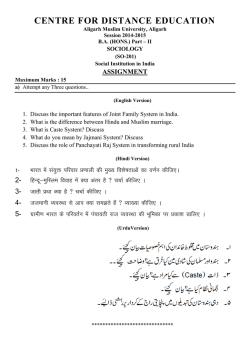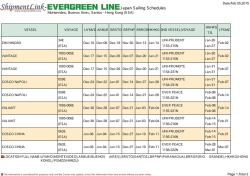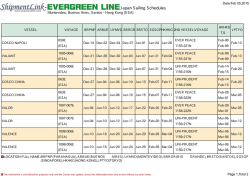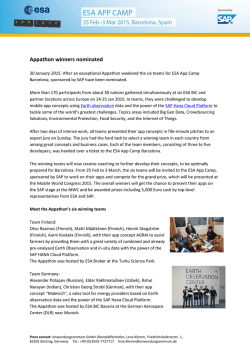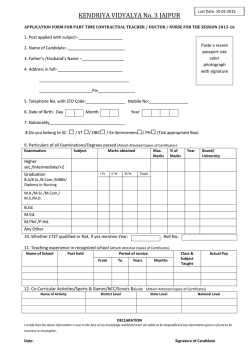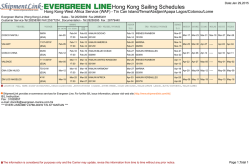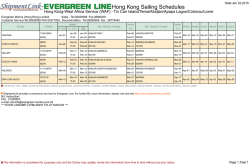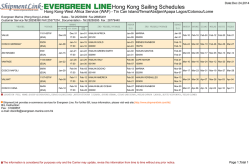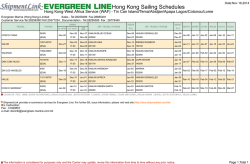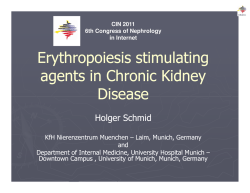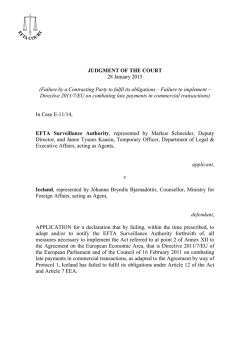
Factsheet on Employment and Support Allowance
National AIDS Trust, ESA & the WCA, January 2015 Employment and Support Allowance & the Work Capability Assessment Information for people living with HIV About Employment and Support Allowance (ESA) Employment and Support Allowance, or ESA, is the main benefit for people who are unable to work due to longterm serious illness or disability. A minority of people living with HIV will need to claim ESA. ESA is divided into two groups: • The Support Group – Designed for people who are considered unable to engage in any form of work-related activity in the foreseeable future. • The Work Related Activity Group (sometimes call the WRAG) – Designed for people who are considered able to move towards work with the right support. Rates of support The ESA Support Group receives a higher rate of support than the WRAG. At the time of writing (January 2015), the rates of ESA were • • WRAG – up to £101.15 a week Support Group - up to £108.15 a week If you apply for ESA, you will be paid an ‘assessment rate’ of ESA while your claim is being assessed (the period between lodging your application and getting your decision – normally 13 weeks). The assessment rate is lower than the full rate of ESA and is the same as is paid to people on Jobseekers Allowance (JSA). • • Assessment rate (25 years or over): up to £72.40 a week Assessment rate (under 25s): up to £57.35 a week The Work Capability Assessment (WCA) The Work Capability Assessment or WCA is the assessment for ESA. The WCA aims to determine whether you have • Limited Capability for Work, and/or • Limited Capability for Work-Related Activity. If the first (1) applies to you, you will be placed in the Work-Related Activity Group (WRAG). If the second (2) applies to you, you will be placed in the Support Group. If neither applies to you, you will be found ‘fit for work’. The WCA is a ‘functional assessment’. This means that the decision is not based on your specific diagnosis but instead is based on how well you can do a range of activities which are relevant to a work environment. National AIDS Trust, ESA & the WCA, January 2015 The WCA looks at the following ‘activities’ to determine if you have limited capability for work and/or work-related activity: Physical activities Mental, cognitive and intellectual activities • Mobilising unaided • Standing and sitting • Reaching • Picking up and moving or transferring by the use of the upper body and arms • Manual dexterity • Making yourself understood • Understanding communication • Navigation and maintaining safety • Continence • Consciousness during waking moments. • Learning tasks • Awareness of everyday hazards • Initiating and completing personal action • Coping with change • Getting about • Coping with social engagement • Appropriateness of behaviour with other people. The extent to which you are able to carry out these activities will be assessed using: • the evidence provided in your application form • information provided by health and care professionals • the findings of your face-to-face assessment (see Application and decision-making process for more details). Exceptional circumstances The functional assessment is the core of the WCA and will be the basis of most ESA decisions. However, there are also criteria to cover ‘exceptional circumstances’. This is sometimes relevant to people living with HIV, especially those who are very ill. These exceptional circumstances rules are sometimes called the non-functional descriptors. The following exceptional circumstances rule/ may in some cases lead to someone being placed in either the WRAG or the support group: “A claimant is suffering from some specific disease or bodily or mental disablement and, by reasons of such disease or disablement there would be a substantial risk to the mental or physical health of any person if the claimant were found not to have limited capability for work [and/or].. work-related activity.” These exceptional circumstances only apply if the risk posed by work could not be remedied by available medical treatment and/or reasonable adjustment. Length of award ESA awards do not come with a set end-date, but you should expect to be called in for a re-assessment to check that you still need the benefit (and are in the correct group) within 1-2 years. The HCP at your face-to-face assessment will normally recommend a time for re-assessment to the DWP – usually between 3 months and 2 years. The DWP will get in touch to tell you when you are due for re-assessment. IMPORTANT: Some people will only be eligible to receive ESA for 12 months. This applies to people who are on ‘contributory’ ESA and are in the WRAG. You may be able to continue to receive ‘income-based’ ESA after this point but you will need to apply. For more information see our separate factsheet on this policy. National AIDS Trust, ESA & the WCA, January 2015 Application and decision-making process They key stages in the ESA application process are as follows: • You phone the DWP contact centre or fill in the ESA1 form (available online) and post or take in to your local Jobcentre plus office. • You fill in ESA 50 form (Limited Capability for Work Questionnaire) sent to you by the DWP after they receive your application, and return by deadline (four weeks), along with any medical evidence to support your claim. • The WCA assessment provider (currently Atos – from March 2015 it will be MAXIMUS) will send you details of an appointment for a face-to-face assessment at an assessment centre. At-home visits can be requested but may take longer to arrange. Most but not all people with have a face-to-face assessment. • You attend the appointment. You can bring someone along (family member, friend, support worker) if you like. The Atos (or MAXIMUS) Healthcare Professional (HCP) will ask you questions about a ‘typical day’, take notes on this and then submit a report to DWP. • A decision-maker at the DWP will consider the evidence provided on your application form, your medical evidence and the report submitted by the HCP and decide whether you have limited capability for either work or work-related activity. • The DWP will let you know if your claim has been successful, the rate of payment you will receive and for what duration, and any activity requirements. The DWP estimates that this process will take 13 weeks from start to finish, during which time you will be paid assessment rate ESA. Sometimes the process takes longer. If you disagree with your decision You might think that the DWP has made the wrong decision on your ESA claim – for example, you have been found ‘fit for work’ or placed in the WRAG group, when you think your support needs are greater than this. If you would like your claim to be re-considered, the first step is mandatory reconsideration. This is a process where the DWP looks again at your claim to see if a different decision is warranted. You can ask for mandatory reconsideration in writing or on the phone – using the contact details in the decision letter. You have one calendar month from the decision in order to ask for your mandatory reconsideration. The DWP does not have any official time limit on how long they will take to complete a mandatory reconsideration. If you have been found ‘fit for work’ you will not continue to be paid assessment rate ESA during the mandatory reconsideration period. If you need financial support during this time you may be able to claim Jobseekers Allowance (JSA). You will have to make a separate claim for JSA. If, following the mandatory reconsideration process, you still are not satisfied with your decision, you can appeal it. An appeal is where an independent tribunal will consider your claim and you will need to lodge the appeal directly with Her Majesty’s Courts and Tribunals Service (HMCTS). You will be paid assessment rate ESA while waiting for your appeal. Remember, you cannot go straight to appeal – you must first have a mandatory reconsideration. If your decision is changed following mandatory reconsideration or appeal, you will start to be paid the relevant rate of ESA. You will also get backdated benefits for the time you were waiting for the decision to be reconsidered. National AIDS Trust, ESA & the WCA, January 2015 Work-related activity People who are placed in the WRAG will normally be expected to do some form of ‘work-related activity’. For most this involves having at least one ‘work-focussed interview’. This is a conversation with an advisor about what work you might be able to do, what steps you could take to move towards work and the support that might be available. You might also be expected to undertake other work-related activities including: • • • Voluntary work Work trials Training People on ESA cannot be expected to look for a job as part of their work-related activity. Most work trials will involve a few days’ experience in a particular job – you might be offered a job at the end of it, but it is not compulsory to take it. If you do not go to the interview and/or do the work-related activity without a good reason, you may be ‘sanctioned’, which means losing your ESA until you fulfil the requirement. If you missed the activity for a good reason, e.g. you were sick, you need to show evidence of this. Some people who are sanctioned are eligible for hardship payments. There are no requirements for people in the Support Group undertake work-related activity and people in the Support Group cannot be sanctioned. Further information THT Direct: 0808 802 1221 - Free, confidential advice over the phone MyHIV – Online community of people living with HIV with advice on topics including benefits www.myhiv.org.uk Official Government guides on benefits- www.gov.uk/browse/benefits Citizens Advice - Make an appointment with your local bureau or read their extensive online advice guide www.citizensadvice.org.uk/ Rights Net - Detailed information about all disability and health-related benefits, with discussion forums www.rightsnet.org.uk/ Disability Rights UK factsheets on benefits topics - www.disabilityrightsuk.org Your local HIV support organisation – search online at www.aidsmap.com/e-atlas For more information on benefits and other everday concerns, visit NAT’s website Life with HIV: www.lifewithhiv.org.uk
© Copyright 2026
